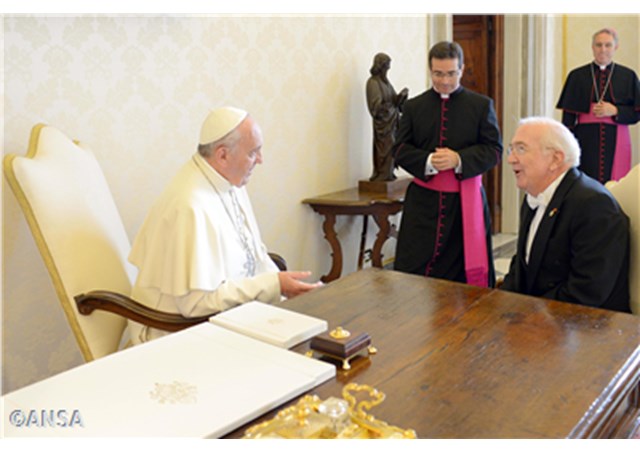
US Ambassador Hackett: countering extremism, Ebola

(Vatican Radio) During his New Year greetings to the diplomatic corps accredited to the Holy See Monday, Pope Francis spoke of the need to bring an end to conflicts in the Middle East: from the Holy Land to Syria and Iraq.
In particular, the Pope expressed his hope for a two-state solution to the Israeli-Palestinian conflict and of the need for a “unanimous response” to halt the “unjust aggression” by fundamentalist terrorists in Syria and Iraq. This same unanimous response, he said, must also work to protect the victims, restore harmony and heal the deep wounds caused by conflict.
The Pope observed that “a culture of rejection” and “enslavement” to fads, power, money or “even deviant forms of religion,” spawn violence and death such as we saw in last week’s attacks carried out by homegrown Islamic extremists in France. Security experts say that like those responsible for the Paris attacks on the satirical periodical Charlie Hebdo and a Jewish supermarket, thousands of young men have gone to fight with radical groups in Syria and Iraq. Many of these young men have come from Europe, the U.S. and elsewhere.
U.S. Ambassador to the Holy See Kenneth Hackett was one of the diplomats to hear the Pope’s concerns on Monday. In part II of a two part interview, Tracey McClure asks him how can alienated young people be discouraged from joining the ranks of extremists?
“I don’t have every answer, but countering violent extremism in any country is something that every nation must take seriously and engage,” Ambassador Hackett responds. “What Paris showed the world, but particularly Europe, is the situation is here, and it’s now. And these young men, born in Paris, I can only gather that they were radicalized by some engagement with an extremist preacher? I think we as governments have to look at those kinds of issues without creating a kind of 1984 mentality of Big Brother. So the balance of liberty with oversight I think is a delicate one and something we all have to take very seriously. We have to believe that what happened in Paris is probably the beginning of something that has been predicted and we’re probably going to see more of it in Europe, maybe in the United States and in other places, sadly. What we can do about it at this point in time is be vigilant and look for opportunities to dissuade young people [from radicalization]. We’ve got to get to the fundamentals: people need jobs, they need opportunities, they need a sense of a future. At the same time, particularly young teenage men are easily led astray. They get a little bit ‘crazy’ at times and if somebody leads them in the wrong direction, it can be catastrophic as we’ve seen.”
Battling extremism at the local level
Some of the best work being done now to counter this type of extremism, Ambassador Hackett observes, “has to have its basis in the local community: in the local mosque, in the churches, in the community associations. And it’s not just going to be the national government that steps in and mandates certain things. People have to find ways of dealing with those kids in the neighborhood (who are) hanging out on the corner and causing trouble. The best way to deal with those kids is to find a religious person who will lead them in the right direction, give them support in the neighborhood. It’s something even in days gone by when we were dealing with issues of juvenile delinquency, well now, it’s much more important. We must come up with local solutions to these types of problems.”
Asked if the U.S. has been successful in its efforts to tackle the root causes of radicalization in the post-911 world, Hackett answers, “not totally.” “I think there’s a lot more we could do and should be doing. We have certainly encouraged local religious leaders of all faiths to engage young people ; we have tried to find best practices and share them around the country and support – I know there are some efforts from the U.S. government to support some of those efforts along with small amounts of money and funding. And maybe we can share that more broadly as well. I know too that we’ve looked at some of the positive and good things that are being done in the U.K. and seeing if they will work in the United States. This is the kind of exchange that hopefully will take place…”
In the interview, Ambassador Hackett also speaks with gratitude of Pope Francis’ remarks praising the work of healthcare workers and religious in treating patients affected by the deadly virus Ebola in Africa.
| All the contents on this site are copyrighted ©. |


